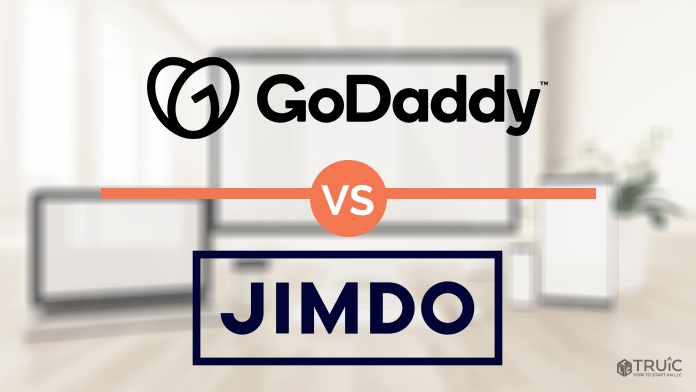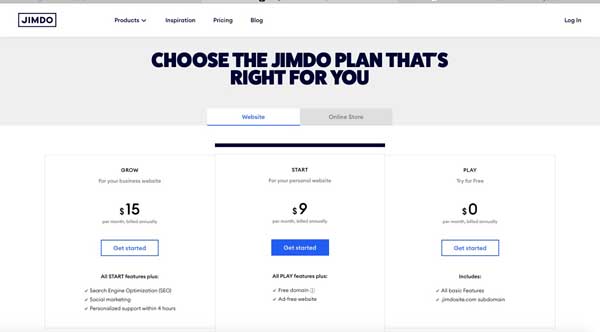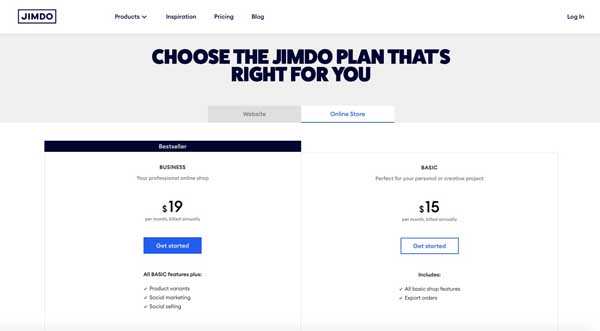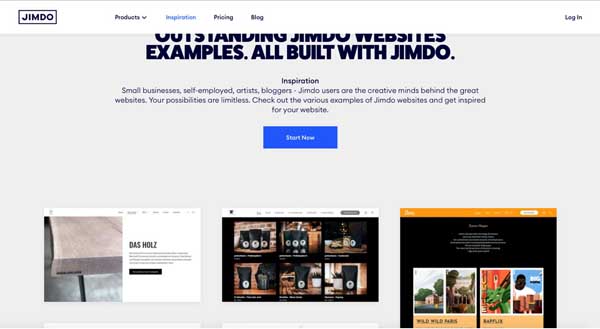GoDaddy vs. Jimdo: Best Business Website Builder Review
When building a website for your small business, choosing the right platform to meet your needs can feel a bit overwhelming. GoDaddy and Jimdo are two popular options for beginners.
If you’re trying to decide between GoDaddy and Jimdo, you came to the right place. In this article, we will do a side-by-side comparison of each platform to help you decide which is the best option for your business.
Not sure where to start? Find the right website builder for you by reading our Best Website Builder Review.

GoDaddy vs Jimdo Review
Having a website for you small business has become a necessity and helps your company get noticed by potential customers. We looked at GoDaddy vs Jimdo and compared their ease of use, pricing, pros and cons and more so you can choose the right fit for your small business.
GoDaddy
Ease of Use
GoDaddy offers an easy-to-use, comprehensive format allowing you to know from the very start exactly what you can expect as a final product. It is among a growing number of platforms promising users the ability to create a website for their businesses in just minutes. Depending on your needs, it is absolutely possible to accomplish this using GoDaddy’s intuitive, drag-and-drop website editor.
One of the few drawbacks of this website builder in terms of ease of use is the inability to change your template once you’ve made your selection. If you pick the wrong one, this can mean additional time and effort spent customizing a template that isn’t set up to meet your needs — be sure to choose wisely before you get started.
Pricing
GoDaddy includes four pricing tiers — Basic, Standard, Premium, and Ecommerce — and all new users are given the opportunity to try the platform for free before they commit to a plan.
The Basic plan is a highly affordable option at $9.99 a month, but many small business owners may choose to opt for the Ecommerce plan at $24.99 — particularly if your business includes retail.

Learn more about GoDaddy Pricing and Plans to figure out which plan is best for your business.
Pros
- Simple, drag-and-drop technology
- Allows you to build a website in just minutes
- Highly affordable
- Ecommerce capabilities
- Search engine optimization (SEO) wizard ensures your website is found via search engines
Cons
- Ecommerce plans may be limited for larger companies
- Would benefit from a more extensive app library
Ecommerce
GoDaddy does offer an ecommerce plan. With this plan, you will have access to a few basic features that should easily meet the needs of smaller businesses. Although these may not be up to par for companies looking for a platform that can scale with their business model.
Some of GoDaddy’s ecommerce services include the ability to add and import products, integrations with third-party payment gateways like PayPal, social media marketplace integrations, and the ability to add coupons and discounts.
Templates and Themes
When you initially sign up for an account with GoDaddy, you’ll automatically be assigned a template based on whichever industry you selected. This template will include pre-filled content that’s relevant to your chosen industry. To create a website quickly, you can simply customize this so that it fully suits your needs.

Though you can’t change the template, if you’re looking to go a bit more in-depth, you can change the theme of your website. Each template includes around 20 themes which allow you to choose between different layouts for your website’s content. All around, GoDaddy’s templates and themes are simple, yet elegantly designed to help you create a beautiful final product.
Apps and Plugins
While GoDaddy does not offer any apps or plugins from third parties, it does have a few useful integrations that you can add to your website in their place. These include the ability to embed videos and livestreams from YouTube and Twitch, as well as playlists via SoundCloud, the ability to take reservations through OpenTable, and real estate listing integration via the multiple listings service (MLS).
You can also add online restaurant ordering with ChowNow, as well as embed Google My Business and Facebook Business reviews.
But the true beauty of working with GoDaddy is that it provides an all-in-one experience. Meaning GoDaddy has ways for you to offer scheduling, appointments, subscriptions, and more. All through the GoDaddy platform. So you never have to deal with a hard to reach third party or pay extra. These features come included with most GoDaddy plans, saving you money and headaches.
Ready to test out GoDaddy? Get started with a GoDaddy free trial to see what this platform can do.
Jimdo
Ease of Use
Like GoDaddy, Jimdo uses straightforward, drag-and-drop functionality for its website editor. This offers users the ability to design a functional website over the course of a single afternoon. You can also speed up the process by using Jimdo’s artificial intelligence (AI) wizard to build your site in under an hour depending on your needs.
That being said, the trade-off here is that it can be very difficult to fully customize your website, with many users complaining that Jimdo’s editor feels restrictive when it comes to changing elements.
Pricing
Jimdo is extremely affordable compared with other website builders on the market. There are two pricing strategies available: Website and Online Store.
Website plans include Play, which is available with limited features free of charge, Start, and Grow.

Online Store plans include Basic and Business. Whichever option you choose, you certainly won’t be breaking the bank. Jimdo provides unbeatable pricing.

Learn more about Jimdo Website Builder Review to figure out which plan is best for your business.
Pros
- Simple, drag-and-drop technology
- Affordable website design plans
- A free plan is available
- Ultra-affordable ecommerce plan
- Site speed is quick
Cons
- Essentially zero apps and plugins
- Limited ability to customize templates
- Templates are not as attractive as other platforms
Ecommerce
Although Jimdo does offer ecommerce features, these are limited compared with other platforms.
Ecommerce through Jimdo is primarily designed for smaller stores doing limited business online. Users can take payments via third-party sources like PayPal and Stripe, but can only list five products on the site’s free plan. Unlimited products are available through the fuller-service Business plan, and those working on a tight budget may find this to be an attractive option.
Templates and Themes
Jimdo isn’t short on templates, with around 100 to choose from. These are sorted by industry, allowing you to quickly and easily find one that works for your business. While Jimdo templates look professional, they are fairly bland and a little too simple to really help your website stand out from the crowd.

Jimdo’s templates also tend to be rather difficult to customize. This results in websites that lack personality and are inevitably a bit inconsistent with your branding. Though they’ll get the job done — and might be perfect for a portfolio — you’ll find these templates also feel a bit outdated.
Apps and Plugins
Like other ultra-affordable website hosting platforms, such as Zyro, Jimdo lacks apps and plugins. In fact, there are essentially zero apps, plugins, and third-party integrations available on Jimdo.
There is also a lack of social media buttons, making it difficult for users to integrate with offsite content of any kind. Aside from the ability to add videos from YouTube and Vimeo, your options in this department are nil.
Our Pick: GoDaddy
Although Jimdo is a decent and affordable option, GoDaddy is the winner in our book. In fact, GoDaddy’s website builder consistently ranks at the top of our Best Website Builder Review.
GoDaddy and Jimdo share similar weaknesses — including limited customizability and no third-party apps or plugins. However, GoDaddy takes the crown with its simplicity and the professional final appearance of websites made using the platform.
To learn more about GoDaddy, read our in-depth GoDaddy Website Builder Review.
Try GoDaddy
Ready to get started with GoDaddy? GoDaddy offers the best free, fast, and professional website builder for small businesses.


